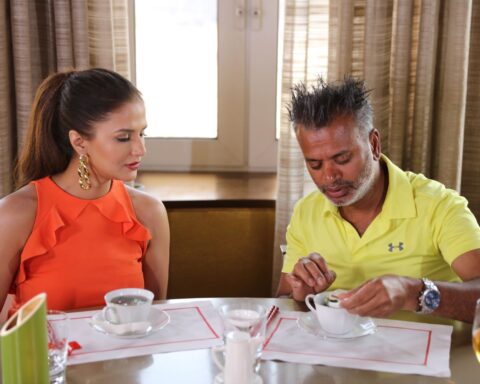When Tomatoes Met Wagner
(Greece, 72 min.)
Dir. Marianna Economou
One can happily report that the fruits of When Tomatoes Met Wagner are certified fresh. This sure-fire crowd-pleaser from director Marianna Economou should appeal to fans of this year’s sleeper hit The Biggest Little Farm. Tomatoes, like Farm, invites audiences to witness the toils of hard-working hands that tend to the fields that feed us. When Tomatoes Met Wagner is Greece’s official submission in the Oscar race for Best International Feature–one of few docs in contention–and it has its Toronto debut at this year’s Planet in Focus Environmental Film Festival before hitting Hollywood with its savoury goodies.
The film offers an amiable portrait of the small Greek village of Elias, which sports a modest population of 33 residents. Despite its size, the farmers of Elias have big plans and hope to conquer the world one scrumptious tomato at a time. When Tomatoes Met Wagner is a fun and frank portrait of the challenges of bringing sustainable and environmentally friendly artisanal products to the masses.
Get ready to tuck in as two men of Elias, neighbours Aleco and Christos, get ambitious with their organic tomato and honey farm. A village with a market of 33 people yields little fortune for farmers, so the friends recruit the elderly women of Elias to lend hands and secret recipes that have been in families for generations. They produce tasty products that bring the flavours of the old country to consumer shelves in fast-paced cities. Little jars of tomato paste, yielded from a 1.5 kilograms of tomatoes each, and layered antipasto savoury snacks are their hallmarks—although shops outside of Greece incorrectly market the snacks and sauces as complete take-away meals.
The doc takes audiences through the ins and outs of this tiny operation. There are no machines for mass production here, only weathered hands that crank the honey, slice the tomatoes, and apply each label one by one. The men tend to the fields, coaxing the tomatoes to grow with the help of classical music, while the old ladies in the kitchen slice and dice at an unhurried pace. They sample the products together, debate the seasoning and spices, and show genuine pride over the fruits of their labour as they chart the travels of their products. It’s a relaxed atmosphere and the kind of work environment that seems like a utopian ideal.
But one doesn’t need an MBA to see that the enterprise is not sustainable. Economou follows the tomato teammates as they travel with their products and learn about the reality of the marketplace from retailers and manufacturers. They simply don’t have the means to produce and market their products, excellent as they may be, in any major way. Economou’s portrait objectively shows the hard disadvantages that artisanal and organic suppliers face, as opposed to manufacturers who can crank out unhealthy, environmentally unsustainable processed foods that conquer the marketplace.
Economou’s filmmaking favours the hand-crafted and artisanal style, and reflects the work ethic of the villagers. With its sunny aesthetic and approach that’s as laid-back and no-frills as the villagers’ operation, When Tomatoes Met Wagner remains optimistic despite the hurdles its subjects face. It offers an ideal to which audiences can aspire. Perhaps savouring the local is better for the planet in the long run.
When Tomatoes Met Wagner screens at Toronto’s Planet in Focus Environmental Film Festival on Sunday, Oct. 20 at noon at Hot Docs Ted Rogers Cinema.











